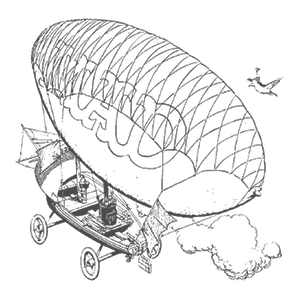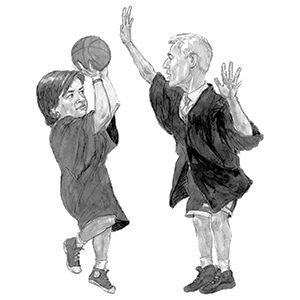The everything bubble refers to the impact on the values of asset prices, including equities, real estate, bonds, many commodities, and cryptocurrencies, due to quantitative easing by the Federal Reserve, European Central Bank, and the Bank of Japan. The policy itself and the techniques of direct and indirect methods of quantitative easing used to execute it are sometimes referred to as the Central bank put. The term “everything bubble” first came in use during the chair of Janet Yellen, but it is most associated with the quantitative easing during the COVID-19 pandemic by Jerome Powell.
The everything bubble notably occurred despite the COVID-19 recession, the China–United States trade war, and political turmoil – leading to a realization that the bubble was a central bank creation, with concerns on the independence and integrity of market pricing, and on the Fed’s impact on wealth inequality. Continue reading
Everything Bubble
Running Gags in Mad
Mad has made frequent use of esoteric words, including potrzebie, furshlugginer, veeblefetzer, Moxie, ganef, halavah, and axolotl. Many, but not all of these words are of Yiddish or Jewish origin. Favored humorous names included Melvin, Bitsko, Kaputnik, Cowznofski, and Fonebone. Mad used the word ‘ecch’ or its cousins ‘blecch’ and ‘yecch’ as an all-purpose expression of disgust so often that even The Simpsons later made passing references to the practice, showing Mad covers with the unseen parodies ‘Beauty and the Blecch’ and ‘NYPD Blecch’.
The word ‘hoohah’ was an early running gag, often exclaimed by excited characters in the comic book issues written by Harvey Kurtzman; the first story in the first issue of Mad was titled ‘Hoohah!’. Its Eastern European feel was a perfect fit for the New York Jewish style of the publication. The precise origin of ‘hoohah’ is unknown, although it may have sprung from the Hungarian word for ‘wow’, which is hűha. Continue reading
Ice Cream Barge
Ice cream barge is the colloquial term for a BRL (Barge, Refrigerated, Large). BRLs were towed vessels employed by the United States Navy in the Pacific theater of World War II to store frozen and refrigerated foodstuffs. They were also able to produce ice cream in large quantities to be provisioned to sailors and US Marines. Three in total were produced: USS Hydrogen, USS Calcium, and USS Antimony.
The ships, concrete barges acquired from the US Army and worth one million dollars, stored 1,500 tons of frozen meat and 500 tons of refrigerated vegetables, eggs, and dairy products indefinitely at 15 °F. To improve the morale of overseas troops, an ice cream freezer facility was included, able to create 10 gallons of ice cream every seven minutes. Continue reading
The Hedgehog and the Fox
The Hedgehog and the Fox is an essay by philosopher Isaiah Berlin that was published as a book in 1953. It was one of his most popular essays with the public. However, Berlin said, ‘I meant it as a kind of enjoyable intellectual game, but it was taken seriously. Every classification throws light on something.’ It has been compared to ‘an intellectual’s cocktail-party game.’
The title is a reference to a fragment attributed to the Ancient Greek poet Archilochus: ‘a fox knows many things, but a hedgehog knows one big thing.’ The fable of ‘The Fox and the Cat’ embodies the a related idea: having one simple, reliable skill is better than boasting many clever but useless plans. Continue reading
Dude
Dude is American slang for an individual, typically male. From the 1870s to the 1960s, dude primarily meant a male person who dressed in an extremely fashionable manner (a dandy) or a conspicuous citified person who was visiting a rural location, a ‘city slicker.’ In the 1960s, dude evolved to mean any male person, a meaning that slipped into mainstream American slang in the 1970s. Current slang retains at least some use of all three of these common meanings.
The etymology of the term is obscure. ‘Dude’ may have derived from the 18th-century word ‘doodle,’ as in ‘Yankee Doodle Dandy.’ Continue reading
Torment Nexus
The Torment Nexus is a term used in critical commentary of the influence of science fiction on technological development. It was coined in a 2021 Tweet by American writer Alex Blechman, shortly following Facebook’s announcement that it would be rebranding to Meta Platforms as part of a shift in the company’s focus towards developing a metaverse.
Dais Johnston of Inverse has defined the Torment Nexus as ‘shorthand for something that backfired in fiction being unironically replicated in reality.’ Reviewing the 2023 CES trade show, Katie Wickens of ‘PC Gamer’ defined the Torment Nexus as ‘a concept that encompasses our growing concern that science fiction will continue to become science fact across the consumer market, with the phobias wrought by technological speculation turning palpable in the hands of money-hungry corporations.’ Continue reading
The Highest Court in the Land
The Highest Court in the Land is the basketball court located on the fifth floor of the United States Supreme Court Building. The Supreme Court of the United States is nicknamed the ‘highest court in the land’ because it is the highest court in the federal judiciary of the United States, and the basketball court is located on a higher floor than the courtroom where the Supreme Court meets, hence the basketball court’s nickname.
While Supreme Court law clerks regularly play on the court, it is less common for the justices to do so. The first justice to play basketball on the court was Byron White, according to fellow justice Sandra Day O’Connor. Continue reading
Chatbot Psychosis
Chatbot psychosis, also called AI psychosis, is a phenomenon wherein individuals reportedly develop or experience worsening psychosis, such as paranoia and delusions, in connection with their use of chatbots. The term was first suggested in a 2023 editorial by Danish psychiatrist Søren Dinesen Østergaard. It is not a recognized clinical diagnosis.
Journalistic accounts describe individuals who have developed strong beliefs that chatbots are sentient, are channeling spirits, or are revealing conspiracies, sometimes leading to personal crises or criminal acts. Proposed causes include the tendency of chatbots to provide inaccurate information (‘hallucinate’) and to affirm or validate users’ beliefs, or their ability to mimic an intimacy that users do not experience with other humans. Continue reading
Even a Worm Will Turn
‘Even a worm will turn‘ is an English language expression used to convey the message that even the meekest or most docile of creatures will retaliate or seek revenge if pushed too far.
The phrase was first recorded in a 1546 collection of proverbs by John Heywood, in the form ‘Treade a worme on the tayle, and it must turne agayne.’ At the time ‘agayne’ also meant ‘against’ or ‘oppose.’ Continue reading
Pig Butchering Scam
A pig-butchering scam is a type of online fraud where the victim is encouraged to make increasing financial contributions over a long period, usually in the form of cryptocurrency. The term compares the initial phase of gaining the victims’ trust to the fattening of pigs before slaughtering them. Such scams are commonplace on social media and dating apps, and often involve elements of catfishing (using false identities), investment fraud, and romance scams.
The scammer builds trust with the victim through online communication, subsequently persuading them to invest in a fraudulent cryptocurrency scheme. Perpetrators are typically victims of a fraud factory, where they are lured to travel internationally under false pretenses, trafficked to another location, and forced to commit the fraud by organised crime gangs. Continue reading
Witness Trees
A Witness Tree is a tree that was present during a grand historical or cultural event of America. Witness trees are centuries old and are known to be of great importance to the U.S. nation’s history. It is unclear how many witness trees there are, but the ones documented are archived in the Library of Congress through the Witness Tree Protection Program, which was founded in 2006.
The program was initially created to document and identify two dozen historically significant trees in the Washington DC area. The creation of the program came from the discovery of Yoshino cherry trees from the year 1910. Continue reading
Flower Thrower
The Flower Thrower, Flower Bomber, Rage, or Love is in the Air is a 2003 stencil mural in Beit Sahour in the West Bank by the graffiti artist Banksy, depicting a masked man throwing a bunch of flowers. It is considered one of Banksy’s most iconic works.
It was inspired by images of 1960s protests, such as Bruno Barbey photograph of the May 68 protests in France (e.g. his photograph of Boulevard Saint-Germain, 6th arrondissement, Paris, France. May 6, 1968). An earlier version was originally drawn by Banksy in 1999 and presented at his first exhibition in 2000.













